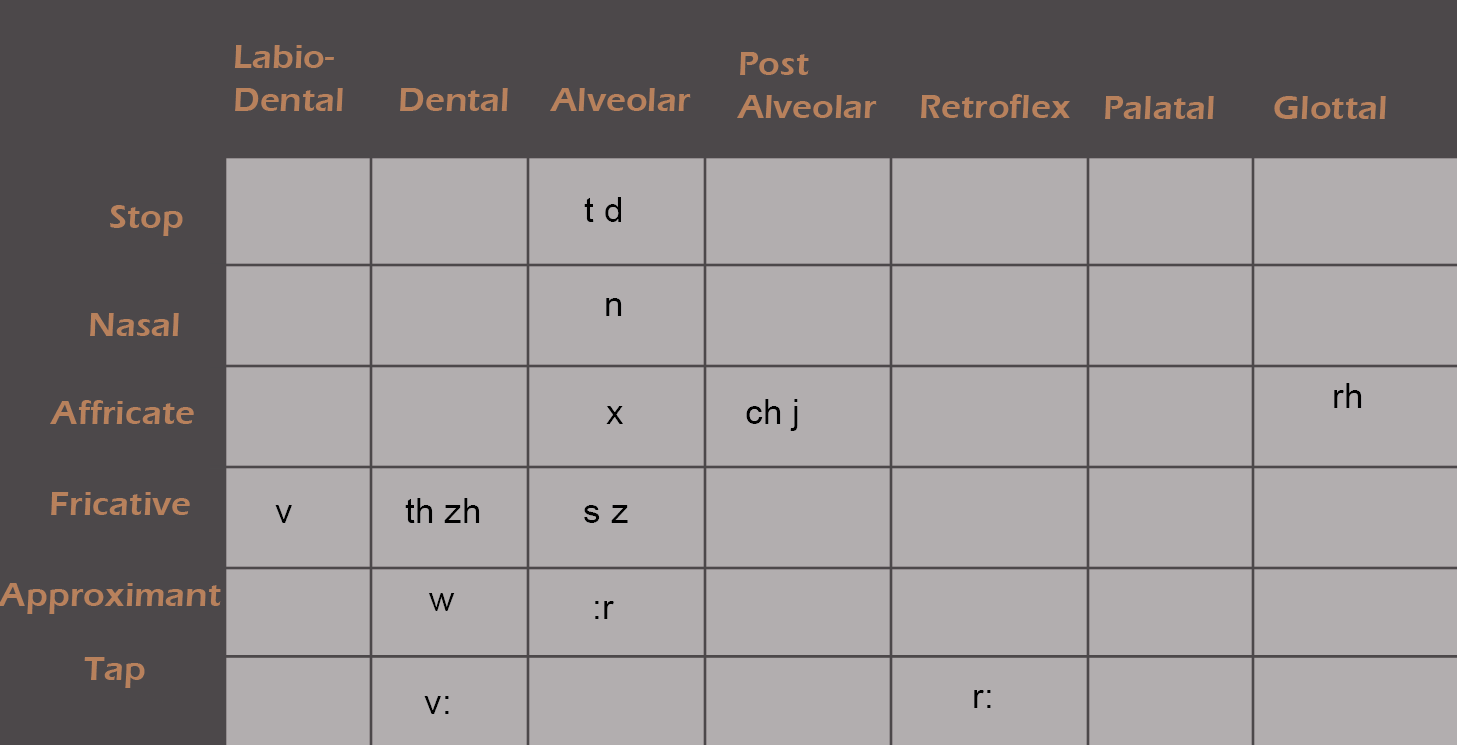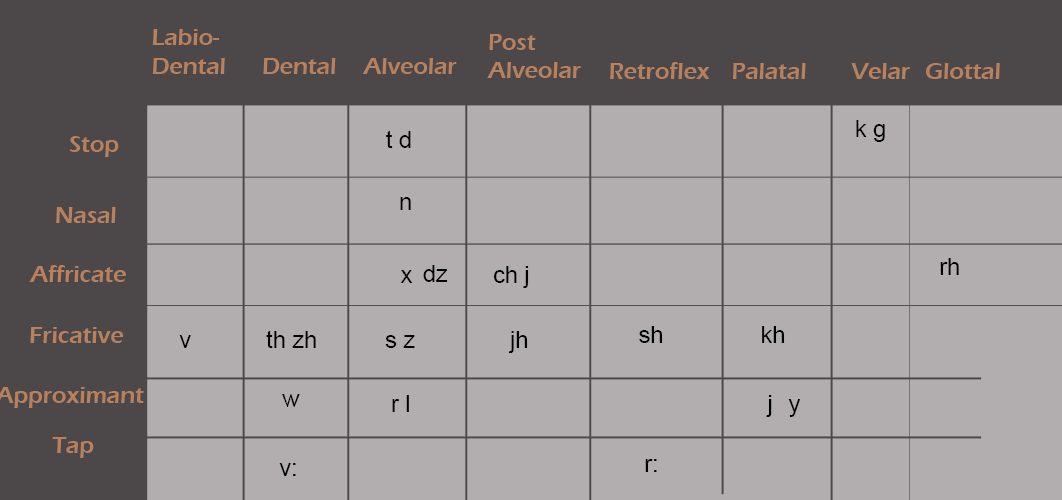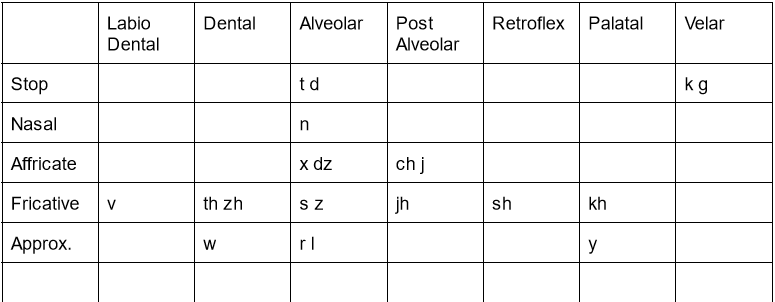THE TONGUE OF WOLVES || Evolutionary Conlang Development
|
THE TONGUE OF WOLVES || Evolutionary Conlang Development
|
|
|---|---|
|
Posted 2022-02-04 23:19:46 (edited)
Anyways, I'm working on a revamp of my lore, and with that, I want to have an actual evolutionary conlang that displays the differences between the wolves who use it. It has a modern name that I know already, and there are other aspects that will come later. For now, I'll leave you guys with this: the proto-language that all wolves in my lore/original setting used way back in the day. You'll notice some key sounds are actually missing. My vowel set isn't included primarily because it's just the basic five and then elongated versions of the same vowels. This is the romanization. The base sound tones are from the IPA and have been adapted.  These sounds aren't used in this same way for... any wolf society at the point of "modern" times, but I thought it would be fun to show the roots. I gave myself one restriction from the bat: no bilabial/lip-only sound creation, because wolves wouldn't be able to manipulate their lips so much. Labio-dental is going to always have minimal inclusion as well. At this point in the lore history, the Structure of Syllable was as follows -- open structure (meaning there are no codas) and stressors as such: - if 2 syllables, stress on last syllable present. if 3, stress on 2nd. if 4 or more syllables, stressor is on the third syllable. |
 BIG RED RAT #41885 |
|
Posted 2022-02-05 00:37:39
if you wanted to say "the wolf digs a deep hole" you'd say "Szcha awaē v:chi veze" awaē being "to dig", v:chi being the modifier "deep", and veze being "hole" adpositions appear after the verb they're effecting. so like, while the sentence "Szcha awaē dnui v:chi veze" would TECHCNIALLY be translated as "the wolf dug yesterday deep hole" its more like "yesterday the wolf dug a deep hole" BUT the possessor-possessee relationship is not typical for the kind of setup here. isntead, what you ahve is have is "[possessed thing] [possessor]", because that shows the dominance of the canine that is the owner of whatever object, because their name is the last thing you hear in relation to what is owned. this includes larger phrases. so like, if you're talking about the pack that is led by Yvar, and you wanted to list the members, you'd do all that talking and then at the VERY END say "belonging to Yvar", at least in this proto-language form. |
 BIG RED RAT #41885 |
|
Posted 2022-02-05 01:04:48
Example: "Zī ucha jwi zhde." -> "I see many birds." Postpositions are used, and are interlocked with verbs. So "Zī ucha jwi zhde", "I see many birds", becomes Zī ucha nu edr:ē jwi zhde" : "I see many birds in the sky." Literally translated, it is -> "I see in sky many birds." There are no tenses in "Aezha Szcha Xwē", either. Instead, there are a series of words revolving around the passage of time, and those are used to indicate when a thing will happen, or when it did happen. This is placed after the verb, but before the Postposition, as follows -- "[Subject] [verb] [postposition] [noun]" would become "[subject] [verb] [indicator of time] [postposition] [noun]'. Example - "Zī ucha nu edr:ē jwi zhde", "I see many birds in the sky" / "I see in sky many birds" becomes "Zī ucha nu chūi nweu edr:ē jwi zhde." --> "I saw many birds in the sky last spring." -> "I see in past spring sky many birds". |
 BIG RED RAT #41885 |
|
Posted 2022-02-05 01:14:03 (edited)
There is one other word involved here, and that is Ndu. Ndu means, simply, "I am doing", though context of a sentence gives it its actual meaning. Ndu itself does not change. Instead, the sentence around it gives Ndu its proper context. As such, the phrase "Ndu chūi", while literally translating as "I am doing past", actually indicates the following phrase: "I did." Ok, yes, technically it's "in the past, i did", but "Ndu chūi" meaning "I did" is an easier translation. If the word chūi or r:ūi would be repeated over four times in a sentence to indicate time, it is not repeated at all. Instead, 'jwi' is added to it. Furthermore, at this time in lore history, there is no developed passive/active verbal tense, either. While one emerges in the future, in this proto-language the use of "chūi or r:ūi " carried a lot of weight in a sentence, and was seen as the key indicator of an action taking place in the past or future. |
 BIG RED RAT #41885 |
|
Posted 2022-02-05 01:42:06
Canines use a complex series of words to indicate time: Seasons, Sun and Moon, and Weather Events are all used to mark time. There are six season indicators in "Aezha Szcha Xwē". Nweu - Spring :Rwāi - Summer :Rwāe - Early Fall. More specifically, the transition from Summer to Fall. Szhvi - Fall Dwūo - Early Winter. More specifically, the transition from Fall to Winter. The least precise measurement, and the only season to be dropped moving forward, as its inconsistency was seen as highly inconvenient. Dwūe - Winter There are ten sun & moon indicators in "Aezha Szcha Xwē". This is because the use of sun & moon as measurements for time was seen as the most precise method for measuring the passage of time. In the future, the numbering system developed would be based off of a combination of the sun & moon indicators and the chūi and r:ūi time indicators. Chzhwe - sun's rise Chzhuo - sun's height Chzhie - sunset Chzhdwa - day time (general term; r:ūi chzhdwa-> "tomorrow day") Ndchu- night time (general term; chūi ndchu -> "yesterday night") Achwe - no moon / new moon Achzhie - crescent moon Achi - half moon Achua - gibbous moon Achaō - full moon. Weather Events were used to mark time only in the past. Major weather events were often times of significant hardship or gain for canines, and as such, were burned into collective memory. V:aua - Blizzard :Rzhu - Flood Rhni - Heat Wave |
 BIG RED RAT #41885 |
|
Posted 2022-02-05 02:04:04 (edited)
Aezha Szcha Xwē LexiconAchwe - no moon / new moon Achzhie - crescent moon Achi - half moon Achua - gibbous moon Achaō - full moon. Aezha - adj. first Awaē - v. to dig Awjawu - den Awjawuvao - occupied den Chūi - past Chzhwe - sun's rise Chzhuo - sun's height Chzhso - "to shine like the sun" - to be friendly, warm Chzhie - sunset Chzhdwa - day time (general term; r:ūi chzhdwa-> "tomorrow day") Dnui - adp. yesterday Dwūo - the transitional period between fall and winter, marked by the first major snowfall or first observed frozen water source Dwūe - Winter Dwrhi - death. lit. "winter-wound". Djawu - to live Elu - great Elurhi - great wound (only spoken in the context of "i gave someone a great wound", or similar bragging statements, primarily in the event the wound is likely to become lethal) Edr:ē - n. sky Edr:ēvao - clearing (derived from the fact that you can see the sky effortlessly in a clearing) Jwi - many Ndōa - to hunt Ndu - I am doing Nua - territory Nuavao - packlands Ndchu- night time (general term; chūi ndchu -> "yesterday night") Nweu - Spring Rhi - wound (both noun and verb; context determines part of speech) R:ūi - future :Rwāi - Summer :Rwāe - Transitional period between Summer and Fall Szcha - n . wolf Szchōa - hunter Szchōavao - hunting ground Szhvi - Fall Tsō - You (singular) Tsō Jwi - You (plural) V:chi - adj. deep Vavao - lake Vayaevao - river Va - water Waē - he/she/it Waē Jwi - they/them Veze - n. hole Xwē - n. tongue Xīo - prey Xīorhi - killing wound on prey Xīovao - place where prey has been found Yae - to move Zi - I/me Zi Jwi - we/us Zhde - bird |
 BIG RED RAT #41885 |
|
Posted 2022-02-05 02:19:18 (edited)
Below is the chart of the "root" modern wolf language.  From this base, all other languages sprout. Some have changed drastically from here, and some have not, but the wolf tongue's varied forms all trace back to this particular point. The Palatal and Velar developments of speech progressed over time as the first major Pack formed, the Voshe (the ancestor-Pack of a modern Clan). From this base, all other languages sprout. Some have changed drastically from here, and some have not, but the wolf tongue's varied forms all trace back to this particular point. The Palatal and Velar developments of speech progressed over time as the first major Pack formed, the Voshe (the ancestor-Pack of a modern Clan).the only two words to transcend all languages trace back to the Voshe. "Rao" and "Skjal" are the only two words that do not belong to a single language. Instead, they are a pan-language pair of terms that have variant meanings. At their core, however, Rao and Skjal always mean the same things: speak and wolf. Skjal is the first notable word to exhibit the closed-syllable trend. Some languages have remained otherwise-open since the days of the Voshe. Others have not. For the purposes of the thread, Voshe will be defined first, then Khujanwi / Uljan, then Dzaba, then - |
 BIG RED RAT #41885 |
|
Posted 2022-02-05 02:56:34 (edited)
Stressors: Syllables are a mix of open and closed, but are primarily open. Stress occurs as such: -if a word has two syllables, the first is stressed, unless the second syllable contains a long vowel, in which case it is stressed. -if a word has three or more syllables, the second is stressed. Numbering System: in the time of Voshe, the first numbering system emerged, utilizing the old tongue's words for the sun and moon as a basis, as follows. Note, however, that the numbering system is pental, based off the phases of the moon. This also marks one of the biggest changes in Voshe. The Chzh noise was eventually conglomerated into the 'k' sound: Kan zero Kwe- one Kuo- two Kie- three Kae- four When counting above four, the following phrases were used instead: Ankae - "slightly more than four" Jwikae - "many more than four" Elkae - "greatly more than four" The use of these phrases was subjective. Eventually, the term "Zhuo-Kae" evolved as a way of saying four again, an indicator that whatever was being interacted with was grouped in a set of four. At this point in time, no major grammatical changes remained in place. No past or future tenses existed. Instead, the rule from before was used in conjunction with the newly-created number system. However, at this point, a method to distinguish between whether the words for day phases were intended to be for the phases or for numbers was needed. As such the modifier din- was added to the front of any indicator of the day. At this point, a common form of speech emerged even more clearly: when addressing someone directly, the form of address for them ("you", etc) would go at the end of a statement as a general rule. This was not a deviation from common grammar, but was instead the solidifying of a structure. "Zi rao chūi din-kwe mo vavao tsō." - "I spoke with you at the lake last sunrise." -> "I speak past sunrise with lake you." "Zi rao chūi-kie din-kwe mo vavao tsō." - "I spoke with you at the lake three sunrises ago." -> "I speak past three sunrise with lake you." |
 BIG RED RAT #41885 |
|
Posted 2022-02-05 19:46:51 (edited)
Au Khujhe is the only accepted language of Khujhe. Speaking any other language including common in one of the holy places of Khujhe is heretical and punishable. However, Uljan is a rapidly-growing lower-tongue. Outside the walls of Khujhe, Uljan is spoken by Khujan wolves quite commonly, but none of them dare do so within the walls, for there are many sentinels who wish to gain favor with the Sun Court by ratting out those who are speaking heretical languages. Of note is the name-title Elsk-Rao, which is given to a singular wolf who speaks on behalf of the Khujan royalty. The title-name translates directly to "Throne-Speaks" or "Throne-Speaker". The Khujhe Empire traces itself directly to the Voshe. Suggesting otherwise is punishable by death. lore note: Svera, Yvar's wife, is from a pack called the "Flamebacks." The Flamebacks were a nomadic radial pack from the Khujhe Empire. More on the function of these radial packs will be provided in a subsequent lore thread. |
 BIG RED RAT #41885 |
|
Posted 2022-02-06 00:45:17 (edited)
AU KHUJHE The official and only legally recognized language of the Khujhe Empire. The entire series of taps and glottals have been dropped from the language. The sound v: becomes 'v' and the sound r: is grouped in with 'r'. Grammar Wise, there are several changes. First, the augmentation 'Yawa' signifies that an object is larger than another of its kind. The further augmentation Ki- is prefixed before 'yawa' to denote further size if need be. 'Sothe' -> stone 'Sotheyawa' -> boulder 'Sothekiyawa' -> mountain The augmentation Weru signifies an object is smaller than others of its kind. 'Khī' -> "pup" 'Khīweru" -> "the runt" ("the pup that is smaller than the rest"). A Complex System of Naming developed as well, as Khujhe has a complex ranking system and rank itself is coded into Au Khujhe. KHUJHEN NAMING CONVENTIONS:Each Khujhen has three parts to their name, with two exceptions, which will be covered later (but have to do with the religion of Khujhe). The [first name] can be just about anything, and has no conventions of its own. The [middle name] is one of a defined set, indicating the current caste-rank of the wolf in question. The [last name] denotes one of two things: if the wolf belongs to one of the Great Families of Khujhe, their last name will be that of the Great Family they are from, even if the wolf in question is a bastard child. If the wolf is not from a great family, then their last name is the last name of their higher ranking parent. The Caste-Ranks are a set series of names indicating where in society the wolf belongs. A Caste-Rank is passed down from the lower-ranking parent in most cases. When a wedding takes place, the lower-caste wolf takes the caste-rank of the higher-caste wolf. The Caste-Ranks are as follows, from highest to lowest: Elā - seen as holy. The Caste-Rank Elā literally marks the wolf as a walking god in the eyes of their packmates. This is the only name that does not pass down upon marriage; a wolf must be born with the Caste-Name. All legitimate children of the Elā caste inherit the name, regardless of the other parent's rank. Vā - the Caste of Faith. Technically on even ground with Caste Kawek. Vā contains wolves who spread the Word, be it with word or tooth. Vā also contains the wolves who lead in sacrifice and bloody purification ritual when the time comes. These are specifically religious leaders and members of what would be called the clergy; the normal faithful do not carry the Vā name. Kawek - the Caste of Defenders. Wolves of Caste Kawek have a single purpose in life: to die for their regents. As such, wolves of Caste Kawek can be granted the name despite not being born in it, but the punishment for cowardice is severe already -- and is even moreso for those who are given the rank and then flee from it. Thoukh - the Caste of Creation. Artisans and the like occupy this caste. It is seen as the last of the 'noble' castes; a wolf of Thoukh, it is said, has to act before you know for sure if they are just a lazy sort or if they actually try to create. Wunzhe - the Caste of foolishness. Being promoted into Caste Wunzhe guarantees both a hard life and a life that is blessed. In every society there are those who are scapegoats; Caste Wunzhe is an entire living class of wolf that occupies the spot of jester. While they have lines to walk as well, they do not have to worry too much about the political wrath of those above them. Some Wunzhe wolves go so far as to engage in the gladiatorial combats to try and strike against their public perception as foolish cowards. Jiadz - the Caste of the Soldier. Defenders are expected to give their lives for the holy; the Soldier merely toils and bleeds for the cause. Gladiators come from this caste a slight majority of the time. Hunters are considered a sub-class of the Soldier, and are not given their own rank. Mekhu - the Caste of the Scout. A hard job in the desert and the surrounding flatlands, scouts are gone from Khujhe for days at a time, if not weeks. As such, they are often subjected to intense sessions of holy purification. Mekhu participate in the gladiatorial pits to prove that they have not been corrupted by the world beyond. Zhon - the Caste of the Worker. It is from this caste that most wolves come. Zhon wolves take up any tasks not done by those above them, including pup-watching and the like. Zhon wolves fight in the arena for a chance at promotion, as the noble castes have historically given Zhon fighers of great prowess a bump in their ranking. |
 BIG RED RAT #41885 |